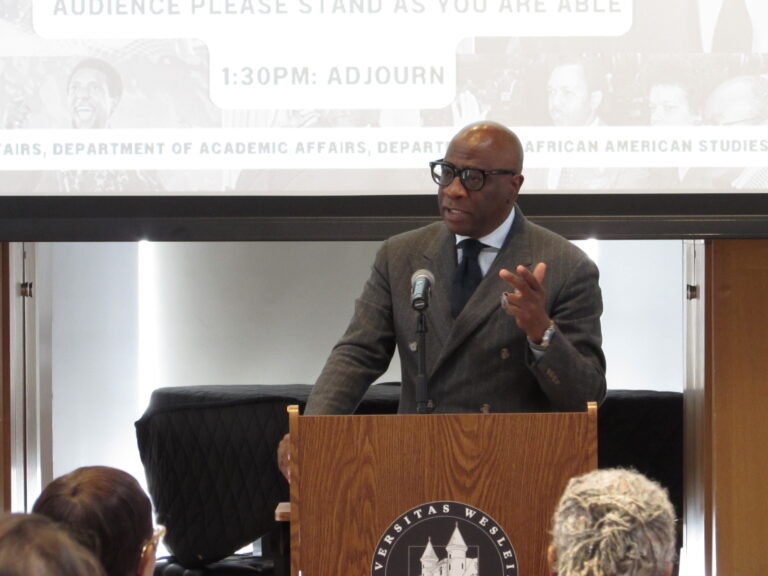WSA Passes Resolution B to Reform Greek Life
On Sunday, April 20, a majority vote by the members of the Wesleyan Student Assembly (WSA) passed a resolution calling for the fraternities with houses on campus to become coeducational.
“[The WSA] calls upon the Wesleyan administration to renew program-housing status to any currently housed fraternity that, by the end of Fall 2014, becomes co-educational in constitution and demonstrates a clear and swift plan of action to become substantively in membership and residence, beginning with an initial co-educated pledge class in Spring 2015,” the resolution reads.
WSA President Nicole Updegrove ’14 described the vote at the meeting.
“The WSA voted 14 for, 12 against, and 1 abstaining,” Updegrove wrote in an email to The Argus. “[Ten] members were not in attendance, mostly due to a confluence of holidays. I would certainly call [four] separate meetings on the issue a difficult process!”
WSA Student Budget Committee Chair and Vice President-elect Nicole Brenner ’15 further elaborated upon the vote.
“The WSA seemed really split on this vote,” Brenner wrote in an email to The Argus. “It’s always difficult to approach such a complicatedproblem, and the sensitivity of this issue only made reaching a decision more complicated. One of the hardest parts is deciding when the time is right to come to a vote; it’s always hard to decide to cut off a conversation but at a certain point there’s not much more that can be said.”
Brenner also discussed her concerns regarding the implications of the resolution, pointing to the fact that Beta Theta Pi (Beta) and Delta Kappa Epsilon (DKE) would likely be forced to give up their houses if the administration requires them to become coeducational (there are no nationally recognized co-ed chapters of either fraternity).
“I think that requiring Beta, DKE, and Psi U [Psi Upsilon] to become coeducational, knowing that Beta and DKE wouldn’t be able to exist under their national chapter, under that condition, I don’t think that’s an appropriate response,” Brenner said. “I don’t think it’s an appropriate first step in solving that issue, especially something that pervades all aspects of our campus…. I would rather take a little bit more time and work with the groups to find reasonable steps they could take.”
The resolution has not been particularly well-received by the University’s fraternities: representatives of DKE, Beta, and Psi U have all expressed concerns.
DKE President Peter George ’15 wrote a statement to The Argus on behalf of the fraternity asserting the fraternity’s position on the resolution.
“DKE also supports the American right to free association, and we oppose Resolution B because it infringes on that right,” the statement reads. “Equally important, we oppose Resolution B because it does not address the root cause of this serious problem. The mere existence of men’s fraternities at Wesleyan is not a cause of violence against women. Requiring the men’s fraternities to become coeducational organizations is very well-intentioned, but will do nothing to protect women from threats to their safety.”
Director of Communication at the Beta Theta Pi Foundation Martin Cobb explained the national fraternity’s stance on the resolution.
“The Fraternity cannot support any resolution that would violate the constitutional rights of any private organization to freely assemble and select its own membership,” Cobb wrote in an email to The Argus. “The precedent of such a decision would not only invite the harshest of legal criticisms, but it would undermine the very spirit of the Wesleyan experience, one that is built upon intellectual growth and personal development—both of which are fostered and encouraged by respecting individual student choices of how and where to get involved on campus.”
Psi U President Jaime de Venecia ’15 also expressed concerns about the Resolution, emphasizing the fact that making fraternities coeducational is no guarantee of ending sexual violence.
“I just don’t think that you can conclude that de-gendering a single-sex fraternity or making [it] co-educated…will absolutely decrease the rates of sexual assault,” de Venecia said. “I think that men and women living together is definitely a nice environment and it helps both sides just learn more and improve as people, but I just don’t think that that will necessarily decrease the chance of sexual assault occurring. Parties will still happen; people will still be very drunk.”
De Venecia emphasized that opinions within Psi U are mixed, with some members backing becoming coeducational.
“There are definitely some brothers who are in support of co-education,” de Venecia said. “It [might not] decrease rates of sexual assault, but rather they just believe in co-education on principle and it’s just a correct thing to do, which I totally understand. And of course there are some brothers who love our tradition to the point that they feel that co-education is not the answer but do obviously want to address this issue that has become such a big one on campus.”
WSA Academic Affairs Chair and President-elect Grant Tanenbaum ’15 addressed this concern, noting that while making fraternities may not solve the problem of sexual assault, it may form one of many steps in a lengthier process.
“I think students are standing up and saying ‘I don’t feel safe in a space,’ and these are University-sponsored spaces and that can’t be ignored,” Tanenbaum said. “And if they don’t feel safe, they don’t feel safe. I think sexual assault is a huge problem and I think everyone agrees that it has to be stopped. I think it’s okay to look at it in pieces and try to solve it in pieces because we can’t solve it all at once.”
WSA Vice President Andrew Trexler ’14 said his vote in favor of the resolution was an easy one.
“It has not been easy to watch others struggle with it so much, but I have not heard a single argument against [the resolution] that I find remotely convincing,” Trexler wrote in an email to The Argus. “The vast majority of arguments against are derived from a desire to preserve a privilege for an already privileged group or derived from a willingness to compromise meaningful progress to avoid hurt feelings, and neither tack is convincing to me in the face of incredible community harm already being done.”
A March 27 Argus article regarding the recent lawsuit against Psi U quoted President Michael Roth on the state of fraternities at the University. In that quote, Roth said that he had not yet seen clear evidence that abolishing fraternities would end sexual violence on campus but noted that if the community sentiment were to indicate otherwise, the administration would take action.
In response to the passing of Resolution B, Roth provided an update on his stance.
“I’ve followed conversations about the future of fraternities at Wesleyan with great interest, and, given my own experience, I am encouraged by the co-education proposal supported by the WSA and several faculty members,” Roth wrote in an email to The Argus. “I will continue to discuss these issues with faculty, staff, students and alumni, and will have more to say to the Wesleyan community after the Board of Trustees meeting in late May.”
Vice President for Student Affairs Dean Michael Whaley argued that although statistics might not be reason enough to make fraternities coeducational, the University’s environment might be.
“Given that only a tiny fraction [of] sexual assaults are reported, looking at quantitative data doesn’t support a specific action,” Whaley wrote in an email to The Argus. “But, I find the qualitative data about how female and trans* students feel about these spaces quite compelling. Although reasonable people may disagree, I feel that the status quo is not tenable. We will continue to listen and consult and then move forward with the changes that seem to best respond to the issues raised during these debates.”
Tanenbaum hopes that people involved in the dialogue remember that the main goal is to end sexual assault on campus, adding that he is disheartened when the conversation topic strays.
“I want to make sure that the motivations we all share are achieved by what these resolutions call for,” Tanenbaum said. “I think the division between unaffiliated and affiliated students on campus has been really discouraging to a lot of people in the debate who, like I said before, share the same goals. I think a lot of students who I’ve been talking to on campus have felt that conversation has become unproductive.”
Now that the resolution has been passed, the WSA will introduce it to Roth, Whaley, and the Board of Trustees.
“Ultimately, this resolution represents our formal recommendation about Greek life,” Updegrove wrote. “It should be noted that there is more legislation that we expect to vote on next week about broader sexual assault reforms.”
4/22/14: A previous version of this article quoted Updegrove stating that eleven WSA members were absent from the vote. Updegrove has since clarified that ten members were absent; the WSA also has a coordinator, who does not vote unless there is a tie. The quote has been amended.







Leave a Reply